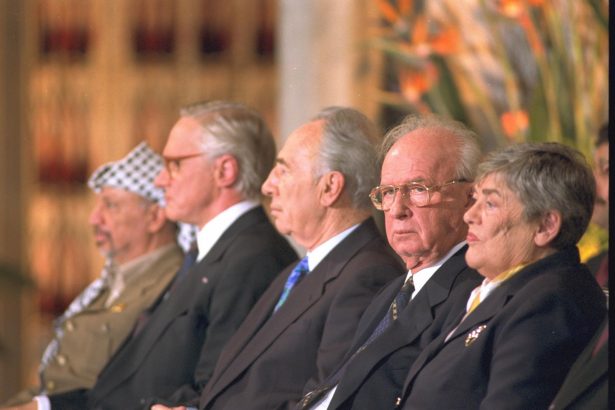Gilead Sher is a former Israeli senior peace negotiator and former Chief of Staff to Prime Minister Ehud Barak. In this essay he argues that despite the flaws of the Oslo Accords and the current paralysis in the peace process all parties stand to lose far more from the cancellation of the Accords than they would gain. He explains in sobering detail the multiple ways in which Israelis, Palestinians and the international community would all suffer, warning that ‘if cancelling Oslo means resorting to one state, this would be lethal to Zionism and to the Palestinian goal to have their own state established throughout a negotiation process. Such a scenario would result in perpetual conflict and a most likely deterioration to a civil war’.
Introduction
Two and a half decades have passed since the 1993 Declaration of Principles on Interim Self-Government Arrangements and the subsequent 1995 Israeli-Palestinian Interim Agreement on the West Bank and the Gaza Strip (the ‘Oslo Accords’).[1] Both agreements were attained throughout an extensive process of Israeli-Palestinian negotiations over three years and sponsored by the international community led by the US. A number of rounds of negotiations (1991-2001, 2007-2008, 2013-2014) failed to reach the end of conflict or to bring claims to a close in a mutual agreement. There seem to be long odds to resolving in the foreseeable future the Israeli-Palestinian conflict comprehensively if at all, in a permanent-status agreement.
The Oslo accord was designed to last for a period of five years, during which time further negotiations were to take place to move the process forward. The identified final status core issues – Jerusalem, refugees, territory and boundaries, security arrangements – that were supposed to be negotiated and subsequently resolved during that five-year period have yet to be agreed upon. Both parties have at various points in time suggested that they would terminate the Oslo Accords due to violations or non-compliance by the other party, or due to the continuous stalemate, as a domestic political token, or to gain leverage over the other party.
The Israeli-Palestinian status quo being as fragile as it is, this essay discusses the ramifications of either party unilaterally canceling the Oslo Accords. Cancellation has pros and cons for each of the parties involved: Israelis, Palestinians, regional actors and the international community. This essay concludes that despite the flaws of the Oslo Accords and some benefits to the Israelis and/or the Palestinians in the aftermath of a cancellation, overall, all parties stand to lose from such cancellation far more than they would gain.
In the nearly two and half decades since the signing of the Oslo Accords (Oslo), leaders from both Israel and the Palestinian Authority (PA) have threatened to cancel the agreements.[2] Perhaps most significantly, at the UN conference in September 2015, PA leader Mahmoud Abbas announced to the assembly, ‘[we] will not remain the only ones committed to the implementation of these agreements. We therefore declare that we cannot continue to be bound by these agreements and that Israel must assume all of its responsibilities as an occupying power, because the status quo cannot continue’. This was widely interpreted to be a threat that the Palestinians would no longer abide by the Oslo Accords, thus cancelling the 1993 and 1995 agreements that have served as the basis for Israeli-Palestinian co-existence and peace negotiations for over two decades. However, the speech was also widely judged to be ‘little more than an empty gesture – and may speak more to Abbas’s political desperation than anything else’.
The likelihood is high that this was Abbas’s attempt to distract his frustrated and disenfranchised constituency from issues such as corruption and dysfunction within the PA. Oslo was signed with the expectation that there would be an interim period lasting five years during which some sort of permanent arrangement would come to bear. However, two out of three times, when negotiations on the most contentious core issues became serious, two developments would prevent a successful completion: The Palestinians would hesitate and the Israeli government would collapse. Additionally, the five-year interim structure was marred by weak implementation and feeble monitoring. Each party has since committed a series of grave violations, making the completion of the planned phases psychologically impossible to execute. As a result, what was supposed to be five years is now going on 24 years, with no foreseeable conclusion. In the absence of meaningful steps taken toward settling the decades-long conflict and implementing the two-state solution, the cancellation of Oslo by either one of the parties stands an increasing chance of becoming reality. However, the ramifications of a cancellation would dramatically affect Israelis and Palestinians as well as the international community.
Effect of cancellation on Israelis and Palestinians
Ramifications of termination for the PA
The PA’s legal existence was created in the 1994 Gaza-Jericho Agreement. Article III.1 of that agreement reads: ‘Israel shall transfer authority as specified in this Agreement from the Israeli military government and its Civil Administration to the PA, hereby established, in accordance with Article V of this Agreement, except for the authority that Israel shall continue to exercise as specified in this Agreement.’ Oslo II then further defined the PA in Article I.1-2 of those accords:
- Israel shall transfer powers and responsibilities as specified in this Agreement from the Israeli military government and its Civil Administration to the Council in accordance with this Agreement. Israel shall continue to exercise powers and responsibilities not so transferred.
- Pending the inauguration of the Council, the powers and responsibilities transferred to the Council shall be exercised by the Palestinian Authority established in accordance with the Gaza-Jericho Agreement, which shall also have all the rights, liabilities and obligations to be assumed by the Council in this regard. Accordingly, the term ‘Council’ throughout this Agreement shall, pending the inauguration of the Council, be construed as meaning the Palestinian Authority.
With Oslo as the basis for the establishment of the PA, the termination of Oslo would mean dismantling the governance of the PA over the Palestinian territories because there would no longer be any legal justification for its existence.
In the aftermath of a termination of Oslo, and therefore of the PA, Israel and the international community would likely work with the Palestinian Liberation Organisation (PLO) as the representative of the Palestinians. However, the PLO and the PA have overlapping roles and conflicting mandates. Moreover, the current incumbent leader of both, Mahmoud Abbas, is struggling for constituency approval. A public opinion poll published in September 2015 found that a record two-thirds of Palestinians wanted Abbas to resign. More recent polls suggest a further drop in support for Abbas. Many Palestinians resent what they see as ‘the transformation of their national movement from groups and leaders dedicated to national liberation to a ruling class with special privileges and a stake in the status quo’.
After 12 years in power Abbas’s electorate has grown ever more divided and dysfunctional. The split between the Hamas-ruled Gaza Strip and Fatah-ruled West Bank served a devastating blow to the PA’s governance. The Palestinians continue to suffer from institutional decline and growing authoritarianism. The latter schism has been a major concern to all parties involved, and on 12 October 2017, an Egypt-brokered reconciliation agreement was signed between Hamas and Fatah, aiming to restore a Palestinian national unity. It is yet to be seen whether this will avoid the fate of a series of failed reconciliation and unity agreements signed between Fatah and Hamas since the latter overtook the Gaza Strip in 2007.
The Palestinian economy is crippled by recurring budget shortfalls, a massive internal debt, rising unemployment and an over-dependency on international donor aid. The latter would likely shrink if the PA were to unilaterally give up on Oslo. Furthermore, Abbas’ four-year term in office has long since expired. The Palestinian Legislative Council (PLC) has not convened in over eight years. This has given Abbas the latitude to avoid accountability for the regression of the Palestinian economy, the repression and the intolerance towards dissent.
The degree of instability inside the Palestinian leadership makes it possible that a collapse of the PA could precede an actual cancellation of Oslo. While this scenario is not equivalent to an automatic termination of Oslo, it could serve as the catalyst for either party to proactively terminate the accords, especially given that the ’95 accords created the PA as a willing and trustworthy partner in the peace process. Either way, it means that the commitments both parties made in the negotiations that led to signing the agreement would be effectively terminated. Such a cancellation would free Israel from the pressure of conceding anything to a corrupt and rejectionist PA, from being roped into reconciliation talks between Fatah and Hamas in order to reunite Gaza and the West Bank and from cooperating on joint economic trade agreements, which the Palestinians, due to the asymmetry between the respective economies, heavily depend on. Israel does not. Taking all the above into account, the Palestinians would be wise to ensure Oslo’s survival.
International aid to the PA
If Oslo is cancelled and with it the PA, the international aid on which the Palestinians heavily depend would shrink, which would further cripple the already-struggling Palestinian economy. The PA received $762 million in international humanitarian assistance in 2014, more than half of which came from countries who would likely freeze such donations in the absence of a functioning Palestinian governance committed to bilateral peace efforts. For example, after Hamas won the parliamentary elections in 2006, all direct aid from the Quartet (EU, UN, US, and Russia) was suspended. The funds to pay approximately 160,000 PA employees and their families was in turn suspended (by the PA) along with funds for basic services such as schools and hospitals. This crucial aid was only resumed by circumventing the Hamas-led administration and channeling the aid directly to Abbas. This example demonstrates that if another power vacuum is created with the termination of the PA, financial aid could once again be suspended indefinitely, including aid needed for government salaries and benefits.
As discussed above, the PA is already facing unpopularity and unrest amongst its people due to various factors: a struggling economy, corruption, oppressive policies, dysfunctional governance and mismanagement of resources. This lack of a clear political direction towards peace and reconciliation creates an unsustainable economic situation. When donor aid increased, government-funded services fueled consumption-driven growth between 2007 and 2012. However, in recent years donor support has significantly declined along with private investment.
The current economic decline could be reversed in an environment where sustainable, private sector-led growth is fostered, alongside a commitment to ongoing financial support from the international community. Abandoning Oslo could leave a vulnerable 4.5 million population (2.7 million in the West Bank and 1.8 million in the Gaza Strip) with a vacuum of leadership that might be filled by extremist groups. The result would be a devastating cut in international financial aid further debilitating the desperate economy.
Economic agreements and trade between the PA and Israel
In accordance with the Paris Protocol of April 1994, the PA serves as the entity to coordinate economic agreements with Israel and other countries. Israeli-Palestinian trade and joint economic projects in fields such as energy, cement, and telecommunications are significant for the Palestinian economy. Palestinians purchase almost all their electricity from Israel and most of their water comes from Israel as well. Furthermore, Palestinian purchases from Israel account for about two-thirds of total Palestinian imports. Palestinian sales to Israel account for about 81 per cent of total Palestinian exports.
By contrast, only 5 per cent of Israeli worldwide exports go to Palestinian territories. If either party terminates Oslo this would destroy the economic relationships binding Israel to Palestine. The joint economic projects which tend to exist to serve the Palestinians would be frozen, resulting in hundreds of millions of dollars in economic losses. The result of an Oslo termination would be Israel’s release from the economic obligations of Oslo-based agreements such as the 1994 Paris Protocol, which was incorporated within the 1995 Interim Agreement, and this would likely benefit Israel.
The Palestinian economy specifically relies on Oslo-era economic coordination with Israel; neither people nor goods can move without Israeli cooperation. The Palestinian physical movement in and out of the country is largely facilitated by the security cooperation with Israel. For example, in 2015 Israel coordinated more than 15.7 million crossings of Palestinians from the West Bank into Israel, most of which were by Palestinians with permits to work in Israel. These work permits provide for the higher average salaries that significantly contribute to the Palestinian economy. Additionally, there were over 190,000 entrances from the West Bank into Israel for Palestinians receiving medical treatment in Israel in 2015. There were also 1,700 crossings of Palestinians to participate in professional health care workshops, exhibitions, and seminars in Israel and abroad in 2015. Israel revokes the permits in the wake of any acts of Palestinian violence, in which case the Palestinian economy suffers due to their reliance on these permits. If Oslo is cancelled, Israel is then no longer obligated to remain committed to economic coordination with the PA. Israel can revoke (until further notice or agreement) Palestinian permits to work in Israel, which would seriously harm the Palestinian economy and leave the Israeli economy relatively unscathed.
In addition to the movement of people, Israel also controls all Palestinian imports and exports that go through Israel’s borders and it continues to collect customs duties for the Palestinians, transferring those revenues to the Palestinian budget. Approximately 80 per cent of the goods and services bought by Palestinians are purchased in Israel, where VAT is paid and then returned to the Palestinian State budget. About 50 per cent of the Palestinian budget comes from revenues collected by Israel and transferred to the Palestinians. When the PA takes unilateral action that harms the peace process, Israel withholds these tax transfers, (for example, in response to the PA’s unilateral move to apply to the International Criminal Court), and would certainly continue to do so in the event of an overall Oslo cancellation.
Another potential economic benefit for Israel, and a detriment to the Palestinians, pertains to water resources. Under the Oslo process a Joint Water Committee made up of an equal number of Palestinians and Israelis was set up to manage the West Bank’s shared water resources. This committee could cease to exist altogether since Israel is in control of the water resources. In the event of the Accord expiration or cancellation, Israel would have even less incentive than it currently carries to coordinate use of such resources with the Palestinians. Israel controls 80 per cent of Palestinian water resources. The 520,000 Israeli settlers use approximately six times the amount of water that the Palestinians in the West Bank use. The ultimate termination of Oslo is likely to further degrade cooperation of the shared water resources to the relative benefit of Israel.
Naji Sharab, a political analyst and professor of political science at Al-Azhar University in Gaza, emphasises the PA’s inability to cut economic ties with Israel by stating:
The decisions mentioned in [the president’s] speech require strength and the ability to end the economic cooperation and agreements, while finding an alternative, should the economic commitment end between both parties. This is not possible now considering the major challenges the PA is facing, most importantly the Palestinian division, the economy’s fragility and the Arab and international community’s [lack of involvement] in the Palestinian cause.
Sharab went on to point out that it was impossible for the PA to resort to decisions that would cut economic ties with Israel since the Palestinian economy completely overlaps with the Israeli economy. At this point in time, Palestinians do not seem to have alternatives which would enable them to end economic cooperation and agreements.
Security and IDF presence in the West Bank
A cancellation of Oslo would have a significant negative impact on the security of both Israelis and Palestinians. As per agreements reached under Oslo II, the PA maintains civilian and security control of territories in ‘Area A,’[3] but the Israeli military (IDF) has ultimate control over all areas of the West Bank, including even ‘Area A’ into which IDF intrusions do take place when necessary. Many Israelis support cooperation between the IDF and the PA, as the cooperation allows the IDF to preserve Israeli lives and resources by not having to serve as the primary security force in ‘Area A,’ while still helping the PA collect intelligence to prevent terror attacks on Israelis. Security cooperation benefits Palestinians as well. Despite the PA’s several threats to end security cooperation if the IDF continues its intrusions into ‘Area A’ territories, Palestinians understand that their best hope for a future state will take working with and convincing Israel that they are capable of overseeing security in the West Bank. With the current fragility of the PA’s governance, security cooperation is increasingly vital for both parties to counter terrorists and radical Islamist and Salafi factions, among other threats.
Cancelling Oslo would result in the termination of this mutually critical security coordination, leading Israel to fully deploy the IDF to the entire West Bank. Such move is likely to create an outbreak of violence, given the vast amount of weaponry currently held by PA police and security personnel, which could find its way into the hands of the militant groups in the West Bank. The inevitable wave of violence, bloodshed, and human rights violations from each party would be devastating. There are no winners under this scenario, which is bound to add suffering and bereavement to all.
Further negative ramifications of cancellation for Israel
Israeli critics of Oslo say the accords mean negotiating with and working alongside an incompetent partner unable and/or unwilling to pull their weight. Even though Oslo did not create terrorism, but rather created the possibility to ultimately end it, these critics point to the waves of increased violence and terrorism since Oslo. The second Intifada which erupted in late September 2000, following the failure to reach agreement at the Camp David Summit, went on for four years and caused thousands of deaths and wounded in suicide terror attacks, ambushes, roadside charges, etc., as well as subsequent Israeli retaliations. Israelis view the anti-Israel, anti-Semitic and religious incitement against it as a clear signal that for the Palestinians any peace process would only serve as the pretext for further weakening Israel and advancing towards its annihilation. Thousands of mortars, shells and rockets launched from Gaza pre-meditatedly over Israeli civilians, as well as the West Bankers’ ‘lone wolves’ terror attacks by car ramming and knives stabbing, have all but extinguished the very last remaining shards of trust.
In short, Israelis have lost faith in the Palestinians. They refer to how the PA is currently running what they see as a nearly failed state in the West Bank with faltering support there and how they lost control of Gaza to Hamas, which has since waged armed struggle against Israel in an openly stated effort to destroy the Jewish state. Many Israelis now think Oslo has created more problems than solutions, and these Israelis see benefits to a cancellation not least no longer having to cooperate with incompetent leaders, terrorist groups, constant incitement and impotent agreement implementation. They do not see the several downsides as clearly as they should.
De-facto one-state solution and Israeli settlements
If Oslo is terminated and with it the territorial designation for Palestinians and the security cooperation between the two parties, Israel would not be violating Oslo agreements by fully deploying troops to the entire West Bank which, as discussed above could become a reality, in order to maintain security. Israel could renounce the formal recognition of the PA/PLO, because it was simply a precondition to the Oslo Accords rather than a desire to recognise the PA. Days before the signing of the first Oslo Accord, each party agreed to accept the other as a negotiation partner in their Letters of Mutual Recognition. The PLO recognised the State of Israel, and Israel recognised the PLO as ‘the representative of the Palestinian people’. Cancelling Oslo would mean that Israel is no longer bound to recognise the PLO and the PLO can renounce its recognition of Israel. With the cancellation of Oslo, neither party is bound to their commitment to recognition of the other as legitimate. This would be devastating to the notion of an independent Palestinian nation because Israel would no longer be bound. Through the Oslo agreements, to work toward establishing and/or recognising a sovereign Palestinian State. Such a scenario would create a de facto one-state situation which, as described below, is not ideal for either party:
One state means that Israelis and Palestinians each receive a mutilated and unsustainable version of its national dream. The Palestinians will never get the national self-determination they seek in a Jewish-dominated single state. Jews will achieve neither the democracy [nor] inner harmony they seek (or ought to), nor legitimacy from the world, as long as they obstruct Palestinian rights to national self-expression in their single state – even before Jews become a minority. Finally, this conflict is tragically likely to ignite again over ‘some damn foolish thing in the settlements’… a one-state solution not only fails to prevent settlements from ripping into … Palestinian land and courting violence, it legitimises expansion – since there is no border. Sadly, we all need one.
As noted above, Israeli settlements are another highly contentious topic in the peace process.[4] They are considered illegitimate, some would argue they are illegal under international law and a serious obstacle to peace. But as their growth did not stop under the commitments of Oslo, it would certainly not stop in the absence of Oslo.[5] Under the first Oslo Accord an arrangement was reached between the parties to postpone a final solution regarding the settlements until permanent status negotiations were cemented. Israel claims that settlements thereby were not prohibited, since there is no explicit interim provision prohibiting continued settlement construction. In Article XXXI.7, the agreement does register an undertaking by both sides namely, ‘[n]either side shall initiate or take any step that will change the status of the West Bank and the Gaza Strip pending the outcome of the permanent status negotiations’. This has been interpreted by Israel as merely imposing restrictions on new settlement building after that date and not as forbidding settlements. With the proactive annulment of Oslo by either party Israel could no longer be accused of ‘violating’ their agreement undertakings[6] (such as refraining from settlement construction), and would continue to build in the West Bank.
International opinion
There is however, a silver lining for Palestinians in losing the possibility of a sovereign nation. This comes in the form of increased sympathy from the international community. As it is now, Israel may be winning the battle of land and economics, but Palestinians are winning the war of international public opinion. The Economist noted:
As the occupation of Palestinian territory has dragged on, sympathy [for Israel] has seeped away. In a poll published in June [2014], before the destruction of Gaza, the citizens of 23 countries put the balance of those who think Israel is a good or bad influence on the world at minus 26 per cent, ranking it below Russia and above only North Korea, Pakistan and Iran. A growing number of Europeans call Israel racist (with the sinister flourish that Israelis, of all people, should know better). And even in America, where a solid majority backs Israel, the share that thinks its actions against the Palestinians are unjustified has risen since 2002 by five percentage points, to 39 per cent. Among 18- to 29-year-olds, Israel is backed by just a quarter.
If the Oslo Accords are cancelled, and Israel takes complete control of the West Bank, this will strengthen the Palestinians’ advantage in the warfare over public opinion. This matters because it is precisely this edge that Palestinians have gained that ultimately led to the UN granting the PA an upgrade from ‘nonmember observer entity’ status to ‘nonmember observer state’ status, which was regarded as providing unprecedented leverage to the Palestinians in their dealings with Israel at the international level. It will most probably increase the level of anti-Semitism and delegitimisation of Israel, thus enhancing the demonisation of the Jewish state and the BDS campaigns against it.
Pros and cons of cancellation for the international community
Increased worldwide terror attacks
The international community has much to lose if Oslo is cancelled by either or both parties. If Oslo collapses, a rise in terrorist attacks can be expected not only in Israel but also in countries allied with Israel to even the smallest degree. This is because terrorist groups as well as terror-perpetrator regimes such as the Iranian one exploit the Palestinian narrative for the sake of political opportunism, as the underlying unifying vehicle sometimes referred to as the ‘Palestine Motivation Effect’: ‘[A]fter all, it makes sense for any movement attempting to gain legitimacy in the Middle East to address one of the region’s most heated debates, which conveniently features two of the usual suspects: Jews and America.’ Osama bin Laden cited Palestinian political grievances more often than religious arguments in his rhetoric. Salafi jihadists like al Qaeda use Palestinian grievances as an opportunity to mobilise resources and support to their cause more than as a religious or ideological priority.[7]
Likewise, the so-called Islamic State of Iraq and Syria (ISIS) has found an opportunity to exploit the Palestinians – particularly in the suffering of Gaza inhabitants. Although, ISIS’s narrative differs from Palestinians’ in that it is not about land, liberty, self-determination and freedom but about Islamic rule in Palestine, the Levant and the World. ISIS examines how the Palestinian narrative failed under the banners of Pan-Arabism and secular nationalists and they are working to radically and actively change what it means to be ‘Palestinian’. By criticising both Arab governance and Israel, as well as international involvement in the conflict, ‘ISIS is essentially exploiting a deep outrage over an issue that is all but irresolvable in the short term. It has an endless capacity to challenge all parties on the ground politically and ideologically without getting its hands dirty by engaging in anything practical let alone constructive, beyond occasional symbolic outreach’. ISIS therefore does not serve as an ally to Palestinians, but as an additional hurdle to addressing actual Palestinian grievances. The more Palestinians suffer in this conflict, as they increasingly will in the cancellation of Oslo, the more Palestinians will remain ‘a compelling chess piece in the Salafi jihadist game,’ and serve as a captivating story in the strategy for ISIS recruitment and international mass killings.
Anti-Semitism
Another international consequence of the cancellation of Oslo is the rising tide of worldwide anti-Semitism. Palestinians have been able to present the situation in Gaza as an illegal Israeli siege over the Gaza Strip, violating basic human rights. This harmful narrative has strengthened the anti-Semitic Boycott, Divestment, and Sanctions movement (BDS). Additionally, anti-Semitic hate crimes are on the rise with an increase especially during the 2014 Gaza War. If Israel fully annexes all Palestinian territories because of an Oslo cancellation, another increase in violence will inevitably break out which will further stir international solidarity for Palestinians and disdain for Israelis.
Conclusion
Since signing the Oslo Accords both parties have accumulated a long list of violations and infringements of the agreement. Cancelling Oslo in general means liberty for Israel to drop its burdensome commitments to the PA/PLO, albeit at the cost of increasing security responsibilities and at the price of waning international support.
The two-state solution is the only option to preserve the Zionist enterprise of a democratic nation-state for the Jewish People in Eretz YIsrael (the land of Israel). If cancelling Oslo means resorting to one state, this would be lethal to Zionism and would likewise detrimentally affect the Palestinian goal to have their own state established throughout a negotiation process. Such a scenario would result in perpetual conflict and a most likely deterioration to a civil war.
Instead of figuring out how to better implement Oslo, perhaps there should be a proactive step taken by either party to annul the agreements in order to reevaluate and start afresh on the condition that the priority is still to achieve ‘two states for two people’. This step should only be taken with a clear plan in mind to (1) prevent the collapse of the PA/PLO; and (2) prevent or minimise a third popular uprising and endless rounds of violent hostilities. This option is regrettably not in the cards at present.
A protracted, intractable and exacerbated Israeli-Palestinian conflict as a result of the cancellation of Oslo would be hazardous to all parties concerned. It will further destabilise the already-turbulent Middle East, foster the Shia radicalism and terrorism perpetrated by Iran and its allies and proxies, and extinguish the faint remainder of hope for peaceful co-existence in this battered area. In conclusion, despite certain advantages to both parties, the path of Oslo cancellation is not recommended.
Reference
[1] The author is grateful to Ms Michelle Curtis and Ms Colleen Tikva Lemmon for their considerable contribution to this article.
[2] In September 2012, Palestinian leader Mahmoud Abbas threatened to cancel the accords. Then two months later, Israel’s foreign minister at the time, Avigdor Lieberman, threatened to cancel the accords and take over, claiming the Palestinians were breaking their commitments. Now we’re back to the Palestinians threatening cancellation.
[3] Areas under full Palestinian security and civil responsibility, i.e. all urban areas comprising the vast majority of the Palestinian West Bank population.
[4] For example, the number of Israeli settlers has more than doubled from 262,500 settlers in 1993 to over 520,000 today, across the West Bank, including 200,000 in East Jerusalem. See Oxfam, 20 Facts: 20 Years Since the Oslo Accords, https://www.oxfam.org/sites/www.oxfam.org/files/oxfam-oslo-20-factsheet.pdf.
[5] Israel could still, however, be held liable for violating the Geneva Convention and UN Resolution 242 and 338 – though it would depend on the interpretation. Israel’s position on the Geneva Convention is that rather than being ‘occupied territory,’ the West Bank is ‘disputed territory,’ thus freeing them of such liability. Israel interprets Resolution 242 as calling for withdrawal from territories as part of a negotiated peace and full diplomatic recognition. The extent of withdrawal would come as a result of comprehensive negotiations that led to durable peace not before Arabs start to meet their own obligations under Resolution 242.
[6] With the exception of Article XXXI.7 of the Israeli-Palestinians Interin Agreement.
[7] This was particularly apparent during Israeli operations in Gaza, like Operation Cast Lead in 2008–2009 and Operation Strong Cliff in 2014.





































